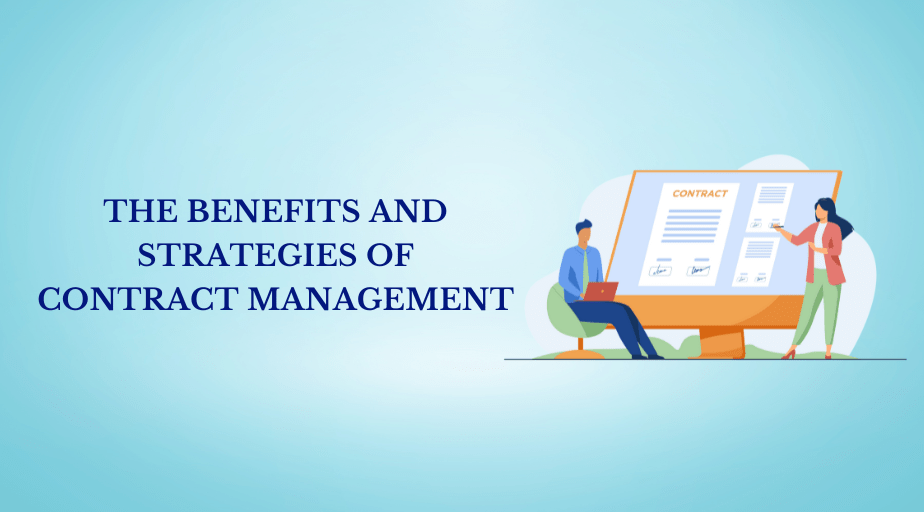Contract management encompasses the end-to-end process of creating, executing, and analysing contracts within an organisation to optimise operational and financial performance while mitigating financial risks. It involves developing, negotiating, and maintaining agreements with various stakeholders such as customers, vendors, partners, and employees. Achieving successful Contract Management Certification necessitates the involvement of skilled professionals, streamlined processes, and the implementation of automated systems. Contract managers must understand legal principles to oversee the contract management process effectively. Contract Manager vs Project Manager, both play vital roles within business firms, although they differ in their areas of expertise, skill sets, and responsibilities. While sharing some similarities, they bring distinct specialisations to their respective roles.
Importance of Contract Management
Contract management holds significant importance within business operations for several compelling reasons:
- Cost Control: Contract management is crucial in controlling costs by ensuring a clear understanding of terms and conditions among all involved parties, adherence to deadlines, and minimising errors.
- Risk Reduction: Effective contract management helps mitigate financial risks by optimising operational and financial performance within the organisation.
- Dispute Avoidance: By promoting a comprehensive understanding of obligations and responsibilities, contract management aids in preventing disputes among parties.
- Time Efficiency: Streamlining and automating contract management processes saves valuable time in managing and creating new contracts.
- Enhanced Productivity: By establishing clarity on terms, deadlines, and minimising errors, contract management fosters increased productivity among all parties involved.
- Compliance Assurance: Contract management enables companies to track vendor compliance and performance, leading to better vendor relationships and overall compliance.
- Improved Contract Visibility: Centralising contracts in a dedicated system enhances contract visibility, facilitating easier access and management of contracts.
Benefits of Effective Contract Management
Effective contract management is crucial for businesses to optimise their operational and financial performance while minimising financial risks. The following are key benefits of implementing effective contract management:
- Cost Savings: By ensuring adherence to agreed-upon terms and conditions before commencing work, effective contract management helps businesses avoid costly disputes and delays, resulting in significant cost reduction.
- Time Efficiency: Streamlining the contracting process through effective management saves valuable time spent on administration, improving overall efficiency.
- Enhanced Efficiency: Effective contract management streamlines processes, reduces administrative burdens, and ensures all parties involved comprehensively understand the terms and conditions of each agreement, thereby improving overall efficiency.
- Collaboration Improvement: Through centralising contracts in a dedicated location, effective contract management facilitates improved collaboration among contract parties, enabling easier access and management.
- Increased Contract Visibility: Effective contract management provides a centralised repository for all contracts, enhancing visibility and making it more convenient to access and manage them.
- Risk Mitigation: Effective contract management helps reduce business and regulatory risks by preventing disputes, achieving cost savings, and ensuring optimal value for products and services.
- Compliance Enhancement: By tracking vendor compliance and performance, effective contract management enables businesses to uphold compliance standards, fostering stronger vendor relationships.
Essential Components of a Contract Management System
A contract management system is vital for organisations to handle contracts effectively. The system encompasses various key components, including:
- Version Control: Implementing a version control feature ensures that the most up-to-date contract versions are accessible to all parties involved, eliminating confusion and promoting uniformity.
- Relationship Management: Managing the relationships between contract parties, stakeholders, and vendors is essential to foster effective collaboration and maintain positive interactions throughout the contract lifecycle.
- Central Repository: A centralised repository houses contracts, templates, amendments, and vendor information, enabling easy access to relevant documents and facilitating efficient contract management.
- Supporting Tools: Utilising supporting tools such as contract templates and checklists streamlines the contract management process, enhancing efficiency and consistency.
- Collaborative Site: A collaborative site provides a platform for stakeholders to conveniently review contracts, ensuring seamless information sharing and accessibility for all necessary parties.
- Key Fields: Stakeholders should have visibility into critical contract fields such as expiration dates and renewal options, allowing for effective monitoring and decision-making.
- Electronic Calendar: An electronic calendar aids in tracking essential dates, including signing deadlines and renewal milestones, ensuring timely actions and avoiding missed opportunities.
- Contract Management Software: Leveraging contract management software simplifies the organisation, monitoring, and record-keeping of contract-related paperwork, enabling centralised control and uniform documentation of contract processes.
Strategies for Successful Contract Management
Effective contract management is vital for organisations to optimise operational and financial performance while reducing financial risk. Here are some strategies for successful contract management:
- Establish a centralised source of contract information
- Drive accountability for contract outcomes
- Align policies, processes, and people
- Utilise a centralised contract management system
- Assign competent contract managers
- Involve the legal department in contract discussions
- Keep track of important dates
- Implement a systematic approach to contract management
- Consider the relationship and duration of contracts
- Monitor and review contract performance
- Use KPIs to measure success
Contract management software can improve workflows by managing the entire process and analysing data. These strategies lead to streamlined agreements, reduced risks, improved business relationships, and increased profitability.
Conclusion
In conclusion, effective contract management is crucial for organisations to control costs, reduce risks, avoid disputes, save time, enhance productivity, ensure compliance, and improve contract visibility. Implementing a contract management system with key components such as version control, relationship management, central repository, supporting tools, collaborative site, key fields, electronic calendar, and contract management software can optimise contract management processes. By following strategies like establishing a centralised source of contract information, driving accountability, aligning policies and people, and monitoring contract performance, businesses can achieve streamlined workflows, stronger relationships, and increased profitability.







